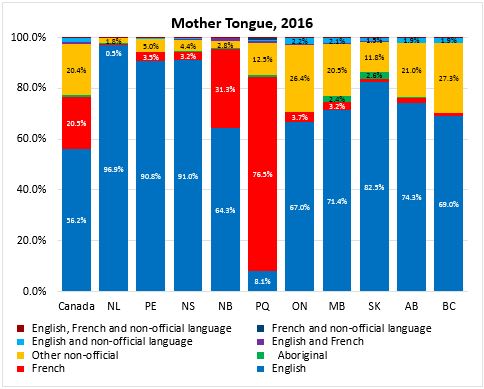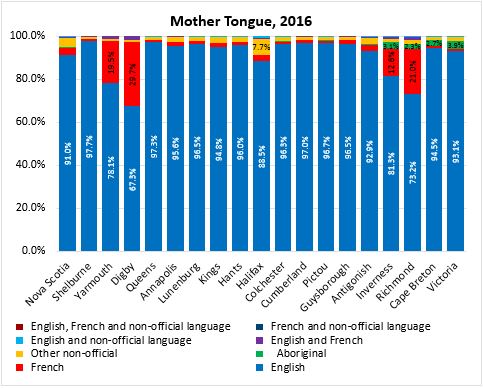For additional information relating to this article, please contact:
August 02, 20172016 CENSUS: LANGUAGE 
In results from the 2016 Census, Statistics Canada reports on languages - including mother tongue(s), knowledge of official languages and languages spoken at home.
Across Canada, 56.2 per cent of the population report English as their exclusive mother tongue, while 20.5 per cent report French as a mother tongue. Another 20.4 per cent of the Canadian population reports a non-official language as their mother tongue while another 0.6 per cent of the population reported an Aboriginal language as a mother tongue. A further 0.5 per cent of Canadians report both English and French as mother tongues, while 1.9 per cent of the population report combinations of English and/or French as a mother tongue in combination with a non-official language.
Nova Scotia's population reported 91 per cent who speak English as a mother tongue, followed by 3.2 per cent who report French as a mother tongue. A futher 4.4 per cent reported a non-official language as a mother tongue while 0.5 per cent spoke an Aboriginal language as a mother tongue. When compared with other provinces, Nova Scotia reports a relatively high portion of the population that speaks English as a mother tongue (second to Newfoundland and Labrador). French as a mother tongue was most commonly reported in Quebec at 76.5 per cent of the population, plus a further 1 per cent who reported French and another language as mother tongues. New Brunswick reported 31.3 per cent of the population with French as a mother tongue. In Ontario, Manitoba, Alberta and British Columbia, over 20 per cent of the population listed non-official languages as their mother tongue. Among provinces, Manitoba (2.4 per cent) and Saskatchewan (2.6 per cent) reported the highest share of the population who spoke Aboriginal languages as a mother tongue.

Within Nova Scotia, there are areas with higher portions of French, Aboriginal and other non-official languages as mother tongues. Digby county reported almost 30 per cent of the population whose mother tongue was French, with a further 1.8 per cent who reported French along with another mother tongue (mostly English). There were also larger shares of French speakers in Richmond County, Yarmouth County and Inverness County. Nova Scotians who reported an Aboriginal language as a mother tongue (mostly Mi'kmaq) were more concentrated in the four counties on Cape Breton Island, with the highest share of Aboriginal mother tongues in Victoria County. Halifax reported a notably higher share of the population that speaks other non-official languages as a mother tongue at 7.7 per cent.

While English and French are by far the most common mother tongues in Nova Scotia, there are 146 separate languages reported as mother tongues among Census respondents in the province (including those who report more than one mother tongue). Outside of English and French, Arabic (8.125), Mandarin (4,770) and Mi'kmaq (4,420) are the largest mother tongues reported in Nova Scotia. These are followed German (3.635), Tagalog (2,400) and Spanish (2,040).
Source: Statistics Canada, 2016 Census: Language